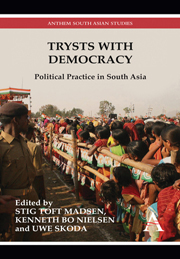Book contents
- Frontmatter
- Contents
- List of Tables
- List of Abbreviations
- Glossary
- Map of South Asia
- Acknowledgements
- 1 Introduction
- Part One Theoretical Issues
- Part Two India
- 4 Ajit Singh S/O Charan Singh
- 5 A Princely Politician in an Indigenised Democracy: A Raja and his Electoral Situation in Rural Orissa 2004
- 6 A Political Breakthrough for Irrigation Development: The Congress Assembly Campaign in Andhra Pradesh in 2003–2004
- 7 Congress Factionalism Revisited: West Bengal
- Part Three Beyond India
- About the Editors
- About the Contributors
7 - Congress Factionalism Revisited: West Bengal
from Part Two - India
Published online by Cambridge University Press: 05 March 2012
- Frontmatter
- Contents
- List of Tables
- List of Abbreviations
- Glossary
- Map of South Asia
- Acknowledgements
- 1 Introduction
- Part One Theoretical Issues
- Part Two India
- 4 Ajit Singh S/O Charan Singh
- 5 A Princely Politician in an Indigenised Democracy: A Raja and his Electoral Situation in Rural Orissa 2004
- 6 A Political Breakthrough for Irrigation Development: The Congress Assembly Campaign in Andhra Pradesh in 2003–2004
- 7 Congress Factionalism Revisited: West Bengal
- Part Three Beyond India
- About the Editors
- About the Contributors
Summary
Introduction
The assumption that factions constitute an elementary aspect of Indian political organisation at all levels was a predominant one in Indian studies in the 1960s and 1970s. From the remotest village to the higher echelons of the pan-Indian Congress party, factions were seen as one of the building blocks of Indian politics. By the 1970s this idea had become so popular that they, in the words of Ranajit Guha (1976, 147), like Russian submarines began to be reported from everywhere. Yet with the decline of village politics studies in rural anthropology and sociology, the fascination with factions gradually evaporated, and today ‘factionalism’ is often dismissed altogether as a concept that, although not entirely without an empirical referent, really tells us very little about the larger and interesting issues of postcolonial politics (Spencer 2007, 36).
In this article I revisit the debate on the role of factions in Indian politics and argue that factions continue to play an important role in India's contemporary democratic set-up. I focus in particular on the case of the Congress party in West Bengal, where the party has – as amply demonstrated in the works of Weiner (1962; 1967), Franda (1971), and Sengupta (1985; 1988) – a factional history that has centred on conflicts and rivalries between personalities aspiring for positions of political leadership, with leaders whose ambitions have gone unfulfilled frequently breaking away with their followers to establish and lead new ‘Congress parties’ of their own.
- Type
- Chapter
- Information
- Trysts with DemocracyPolitical Practice in South Asia, pp. 157 - 192Publisher: Anthem PressPrint publication year: 2011
- 5
- Cited by



